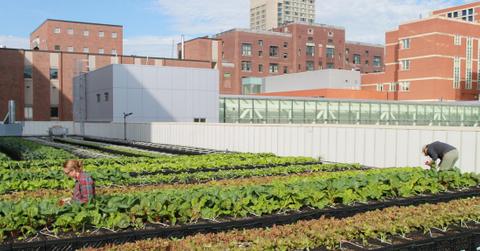Hospital Creates Largest Rooftop Farm In Boston
Hospitals around the country are starting to grow food on their property to offer patients healthier meals. Boston Medical Center has become a leader in this trend by creating the first hospital-based rooftop farm in Massachusetts. As the largest rooftop farm in Boston, they can feed their community while helping cut back on carbon emissions.
Updated May 24 2019, 10:11 a.m. ET
An apple a day might keep the doctor away, but hospitals now are bringing local fruit directly to their patients. Farms and gardens are sprouting up on hospital grounds all around the country. Health Care Without Harm’s Healthy Food in Health Care, a program focused on helping hospitals offer their patients healthy foods, has started to notice that hospital grown produce is becoming increasingly more common.
The director of the program, Stacia Clinton, points out that offering local produce is a logical step for hospitals, “There is an increasing trend in hospital farms. There’s a greater demand now for people to know where their food is coming from, and hospitals are looking for ways to connect people to their food more directly.”
One New England hospital, Boston Medical Center (BMC), has become a leader in this movement and recently set up a farm on top of their building. Not only is it the largest rooftop farm in Boston, but the sky-high project is also the first hospital-based rooftop farm in Massachusetts.
The 7,000 square foot farm hopes to generate 15,000 pounds of food every season and has already produced 1,800 pounds since June. Some harvested items will include kale, bok choy, arugula, tomatoes, carrots, eggplants, cucumbers, and peppers. The rooftop also has a set of two new beehives that will produce honey for the hospital.
So who will be able to enjoy all this fresh food and honey? The hospital’s patients, of course, but BMC has also found several other uses for the farm. The hospital has a Demonstration Kitchen which allows people to visit the rooftop and learn about cooking with seasonal and healthy ingredients. The program helps people get hands-on experience to learn how to grow food as well. The farm also benefits BMC’s preventative food pantry which gives low-income patients access to fresh food.
The motivation for the rooftop garden was a no-brainer for BMC. With access to a farm just steps away from the kitchen, BMC can minimize carbon emissions produced by transporting food. On a practical level, the increased green space also helps reduce the building’s energy use and manages stormwater runoff during heavy rainfall. With endless educational, environmental and health benefits, the rooftop farm offers not only a way to decrease BMC’s carbon footprint but also help their community.
BMC senior director of support services, David Maffeo, explains why the hospital decided to take on this project, “The goal with our rooftop farm is to provide fresh, local produce to as many of our patients, employees, and community members as possible. This initiative supports our mission to address social determinants of health by improving access to healthy fruits and vegetables, and it is a perfect example of BMC's dedication to sustainability and green efforts.”
Since doctors and nurses don’t have time to roll up their sleeves and start growing plants, BMC teamed up with experts Lindsay Allen and John Stoddard from Higher Ground Farm (HGF). HGF specializes in designing and installing organic rooftop farms in the Boston area. BMC works with a farm manager to oversee the crops.
BMC's sustainability efforts don't just stop there. They're also planning to use solar power and hope to become the first carbon-neutral hospital in New England by 2018. Several environmental groups have already acknowledged the hospital's green efforts, and BMC was named one of the 50 greenest hospitals in America by Becker’s Hospital Review. So far, BMC continues to focus on providing their community organic fresh food and is on target to produce 5,000 pounds of produce by the end of the year.
